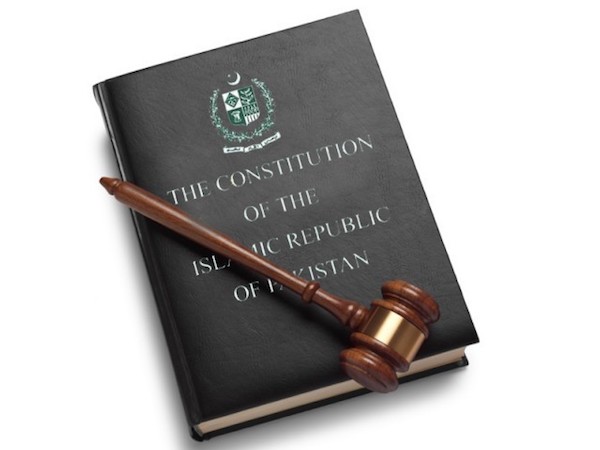
The problem with religious laws is that they are easy to enact but difficult to amend or repeal

“This is the problem with religious laws. They are easy to enact but very difficult to amend or repeal. Consequently, one should move extremely cautiously while introducing a feature in the legal system which has religious connotations. It may earn one brownie points with the religious community in the short term but is not good for maintaining religious harmony in the long run. They become a tool in the hands of criminal-minded persons who start using them to embroil their opponents in highly questionable litigations that get so controversial during the course of trial that it becomes almost infeasible to decipher the truth”.
More wars have been fought in the name of religion than anything else in the history of our world. In other words, more people have been killed for causes that supposedly espouse peace. It is thus always advisable if one wishes to achieve peace and harmony to lower the religious sentiments. Ironically, this conflicts with the fact that it is always easier to exploit people’s feelings in the name of religion and attain popularity and what one wishes to gain politically or otherwise.
I was in China a couple of years ago and was surprised when the youth I was talking to, gave me a blank expression when I raised the subject of God. They had absolutely no idea about it. There are few places left on our planet now where this is the case. Almost all communities have religions and they have to live together despite all their attempts to maintain homogeneity. Hindus, perhaps, have always been in majority in the Indian subcontinent, but Jains and Buddhists have lived along with them. The Muslims invaded India and most of the Muslim rulers had a liberal, if not totally secular approach towards other religious communities. However, the Muslims in India are now paying the price for some of the follies committed by them. The British brought Christianity and a set of laws and a system which continues to exist in all of their colonies. The Indian Penal Code 1860, which is called the Pakistan Penal Code across the border, is one such law that continues to remain in force despite a lapse of 157 years. Its Section 295 says:
“Whoever destroys, damages or defiles any place of worship, or any object held sacred by any class of persons with the intention to thereby insulting the religion of any class of persons or with the knowledge that any class of persons is likely to consider such destruction, damage or defilement as an insult to their religion, shall be punished with imprisonment of either description for a term which may extend to two years, or with fine, or with both.”
Section 295-A was added to the Penal Code by the British in 1927 to avert outraging of religious feelings of any community. It states: “Whoever, with deliberate and malicious intention of outraging the religious feelings of any class of the citizens of India, by words, either spoken or written, or by visible representations, insults or attempts to insult the religion or the religious beliefs of that class, shall be punished with imprisonment of either description for a term which may extend to ten years, or with fine, or with both.”
As luck would have it, in 1986, when General Zia-ul-Haq was the President and a civilian government led by PM (Mohammad Khan) Junejo was in power, human rights activist Asma Jehangir, in a press conference, commented on the educational status of Prophet Muhammad. It led to a huge controversy and the government in panic inserted Section 295-C in the Penal Code which read as follows:
“Whoever by words, either spoken or written, or by visible representation, or by any imputation, innuendo, or insinuation, directly or indirectly, defiles the sacred name of the Holy Prophet Muhammad (peace be upon him) shall be punished with death, or imprisonment for life, and shall also be liable to fine.”
There was no looking back. The Federal Shariat Court, another creation of General Zia, in a subsequent ruling held that the words “or imprisonment for life” be deleted from this provision; it now carries the mandatory death penalty. At the time of addition of Section 295-C, the Criminal Procedure Code 1898 was also amended to state that an accused under this Section or under 295-B (dealing with defiling of the Koran), again inserted by General Zia, can be held without warrant, and that the court of session trying a case under Section 295-C must be presided over by a Muslim.
In 2011, governor of Punjab province Salman Taseer and the Federal Minister for Minorities, Shahbaz Bhatti, were killed simply because they had talked of amending the above sections in the Penal Code.
The governor was killed by his own guard and only a few dozen dared to attend his funeral prayers. As opposed to this, hundreds of thousands attended his assassin’s funeral after he was hanged. The judges in the present environment rarely feel secure to dispense justice; and they can hardly be blamed, particularly after the fate of Justice Arif Iqbal Hussain Bhatti, who was assassinated in October 1997 in Lahore. What was the judge’s fault? He had acquitted Salamat (a 14-year-old), Rehmat and Manzoor Masih, from the blasphemy charge in 1995. The judge who convicted the governor’s assassin had to leave the country for a couple of years.
This is the problem with religious laws. They are easy to enact but very difficult to amend or repeal. Consequently, one should move extremely cautiously while introducing a feature in the legal system which has religious connotations. It may earn one brownie points with the religious community in the short term but is not good for maintaining religious harmony in the long run. They become a tool in the hands of criminal-minded persons who start using them to embroil their opponents in highly questionable litigations that get so controversial during the course of trial that it becomes almost infeasible to decipher the truth. No doubt more Muslims are tried under these laws than minorities but most of the convicted ones belong to the religious minorities. In other words, the laws have become a tool in the hands of a section of the population to crush the religious minorities; if the latter gets into any kind of dispute whatsoever with a Muslim, the easiest way to punish the adversary is by accusing him or her of blasphemy. The state machinery takes care of the rest.
(The author is a lawyer in the Supreme Court of Pakistan)





Be the first to comment